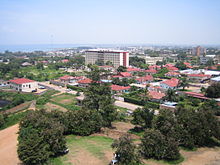Culture of Burundi
The culture of Burundi is based on local tradition and the influence of its neighbors, though its prominence has been hindered by civil unrest.
Society
Most Burundians live in rural areas. Since the hilly landscape has hindered the development of villages, small clans live as extended families in hilltop compounds called rugos. These families usually farm the surrounding hills to avoid tsetse flies in the valleys. A large portion of the population lacks health care and even safe drinking water, which causes many people to seek traditional and herbal medicine to treat diseases. UNESCO and the Peace Corps have set up programs to help improve living conditions.
The majority of the population is Christian, though Islam and forms of animism are also present. Arranged marriages are not uncommon, with the groom’s family sometimes paying a bride price.
The two official languages of Burundi are French and Kirundi. Kirundi is the most widely spoken language, though French is used in most written or official documents. A smaller population of Burundians speaks a dialect of Swahili.
City residents often take a siesta, and most businesses will be closed in the early afternoon.[1]
Music
Traditional drumming is an important part of Burundian cultural heritage, as indicated by the world-famous Royal Drummers of Burundi. Traditional dance often accompanies the drumming, which is frequently seen in celebrations and family gatherings. Some Burundian artisans have special songs to accompany different stages of their work.
Literature and Oral Tradition
During the 1972 genocide, many Burundians involved in higher education were killed, stalling written culture. This combined with the lower literacy rate have encouraged an adherence to Burundi’s strong oral tradition, which relays history and life lessons through storytelling, poetry, and song. This is evident in kivivuga amazina, an improvisational poetry contest played by cattle herders, in which they boast their abilities or accomplishments.
Recreation

Football is a popular pastime throughout the country, as are mancala games. Many Burundians celebrate Christian holidays and Burundian Independence Day, though the largest celebration occurs on New Year’s Day with feasting and traditional drumming and dancing.
Food and Drink
Burundian cuisine often contains red kidney beans, and is not usually accompanied by sweet foods or dessert. During celebrations and gatherings, Burundians drink homemade banana wine and beer, sometimes drinking through straws from a single large container.
In some areas, brochettes and frites are a popular remnant of the Belgian colonial period. A national brewery produces Primus and Amstel beers.[1]
Education and Environment

The central university for Burundi is the University of Bujumbura. There are several museums in the cities, such as the Burundi Geological Museum in Bujumbura and the Burundi National Museum and the Burundi Museum of Life in Gitega.
There are several wildlife and nature preserves, and the southern town of Rutana contains a monument to the source of the Nile River.
